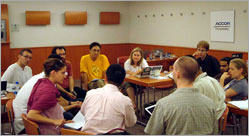| |
 |
| |
| When an employee feels that his aptitude, resources or needs are not gelling with the requirements of the job thereby resulting into physical and emotional responses, that’s what work stress is all about. It’s a phase when an employee is unable to meet the job demands, feels exhausted and tensed all the time and his job satisfaction level takes a dip. |
| |
 |
| |
| Causes |
| What really instigates work stress? |
|
- Lengthy working hours
- Irrational performance demands or no demands at all
- Absence of professional training
- Interpersonal relationships: Inadequate social surroundings, or working with people you don’t get along with, or being bullied/harassed, can all lead to work stress.
- No appropriate co-ordination of work
- Lack of interest in job
- No balance between personal and professional life
- Job Security: This is not a ‘job for life’ era any more. Lack of growth leading to change of job, takeovers, mergers, recession, all these have turned out to be main stressors for employees.
- Lifestyle: Employees leading a poor lifestyle with no healthy diet, absence of exercise and not getting proper sleep may lead to stress at work.
- Management: Poor communication between organization and employees, lack of employee-friendly policies, non-participation of employees in decision making, can lead to work stress.
- Work commute: Most of us work far away from home, so commuting by road and railways can be equally stressful especially during rush hours.
- Environmental conditions: Functioning in unhealthy circumstances like badly designed workspace, inadequate ventilation, extremely crowded places, too hot, noisy– all can lead to work stress.
- Technology: Growing use of high technology has increased the expectations of employee’s productivity and efficiency. To keep with the latest technological developments, employees are constantly forced to learn new packages.
|
|
| |
 |
| Consequences and Symptoms of Job Stress |
| The following symptoms may point out job related stress among people. |
- Physical Signs: Stress may include migraines, sleep disorders and increased heart rate.
- Emotional Signs: Mood swings, feeling of helplessness, negativity and frustration.
- Behavioral Signs: Eating disorders, job dissatisfaction, de-motivation, no concentration at work, loss of work commitment, absenteeism and taking up bad habits like drinking, smoking and drugs.
|
 |
| |
 |
| |
| Management Approach |
- Have a open communication:
- It would be great to have clearly defined functions and responsibilities for the employees.
- Communication lines need to be efficient and friendly
- Extend incentives and promotions:
- Praising excellent performance vocally would be a good boost for employees
- Make provisions for career growth of employees
- Discuss with employees:
- Make employees accountable for decisions that involve their own jobs
- Check with employees about their say on rules and regulations set for them
- Promote cordial and social atmosphere:
- Set up a stern policy for harassment
- Organize social events for developing inter-personal relations among employees
- Re-design work structure:
- Design stimulating and interesting jobs that will permit employees to use their finest skills
- Avoid unrealistic targets and deadlines for employees
- Ensure that the workload is gelling with the employee’s capacity
- Show you care:
- Provide flexible working hours for employees
- If possible, encourage working from home to reduce stress and time of commute
- Ensure employee’s personal leave plans such as extended maternity leave are in place.
|
|
|
|
TOP |
|














